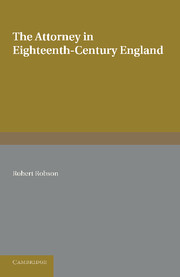Book contents
- Frontmatter
- Dedication
- Contents
- General Editor's Preface
- Preface
- Chapter I Attorneys and Solicitors Before 1700
- Chapter II Regulation of the Profession
- Chapter III The Society of Gentlemen Practisers
- Chapter IV The Provincial Law Societies
- Chapter V The Making of an Attorney
- Chapter VI The Attorney in Local Society
- Chapter VII Estates and Elections
- Chapter VIII Administration and Finance
- Chapter IX Two Attorneys
- Chapter X The Road to Respectability
- Appendix I The Apprenticeships of Richard Carre and Samuel Berridge
- Appendix II The Admission of an Attorney
- Appendix III Christopher Wallis: Notes from the Journal
- Appendix IV A Note on Numbers
- Appendix V The Professions in the Eighteenth Century: a Bibliographical Note
- List of Primary Sources
- Index
Chapter X - The Road to Respectability
Published online by Cambridge University Press: 05 June 2016
- Frontmatter
- Dedication
- Contents
- General Editor's Preface
- Preface
- Chapter I Attorneys and Solicitors Before 1700
- Chapter II Regulation of the Profession
- Chapter III The Society of Gentlemen Practisers
- Chapter IV The Provincial Law Societies
- Chapter V The Making of an Attorney
- Chapter VI The Attorney in Local Society
- Chapter VII Estates and Elections
- Chapter VIII Administration and Finance
- Chapter IX Two Attorneys
- Chapter X The Road to Respectability
- Appendix I The Apprenticeships of Richard Carre and Samuel Berridge
- Appendix II The Admission of an Attorney
- Appendix III Christopher Wallis: Notes from the Journal
- Appendix IV A Note on Numbers
- Appendix V The Professions in the Eighteenth Century: a Bibliographical Note
- List of Primary Sources
- Index
Summary
IN his play Pasquin, first performed in 1736, Fielding wrote:
Religion, law, and physic, were designed By Heaven the greatest blessing on mankind; But priests, and lawyers, and physicians made These general goods to each a private trade, With each they rob, with each they fill their purses, And turn our benefits into our curses.
This was typical of the general belief in the earlier part of the eighteenth century that professional men were merely parasites. They were not engaged in productive labour; they made their living out of other people's misfortunes. The doctors and the lawyers especially, and among them, the apothecaries and attorneys more particularly, were subjected to the almost universal abuse of the satirists and commentators of the time, in plays, pamphlets, and novels. They were quacks and pettifoggers; they exploited the mysteries of their craft for their own ends. What they did for their clients had largely to be left to their own judgment, and this judgment was assumed to be exercised primarily in their own favour. They were expected to be hypocritical, selfish, and cunning, and were liberally abused for doing what was expected of them. It certainly gave a man no special prestige to be an attorney: rather was it a social handicap he had to overcome. Tom Clarke, in Smollett's novel Sir Launcelot Greaves, ‘never owned himself an attorney without blushing’.
This does not mean that men of gentle birth are never found as attorneys in this period; Thomas Fane, a Bristol attorney, succeeded to the Earldom of Westmorland. Nor does it mean that a man never achieved gentility by means of the profession. On the contrary, it provided a social stepping stone for a good many people of humble birth. But the profession was merely a stepping stone to gentility in these early stages, and men who had exploited the undoubted possibilities of gain presented by the profession were not usually content to remain attorneys, nor to found merely professional families. They got into the landed gentry as quickly as they could for their profession as such conferred no particular dignity.
- Type
- Chapter
- Information
- The Attorney in Eighteenth-Century England , pp. 134 - 154Publisher: Cambridge University PressPrint publication year: 2013
- 1
- Cited by

